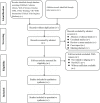The efficacy of Qigong exercises for post-stroke mental disorders and sleep disorders: Protocol for a systematic review and meta-analysis
- PMID: 32846809
- PMCID: PMC7447379
- DOI: 10.1097/MD.0000000000021784
The efficacy of Qigong exercises for post-stroke mental disorders and sleep disorders: Protocol for a systematic review and meta-analysis
Abstract
Background: Post-stroke mental disorders (PSMDs) and post-stroke sleep disorders (PSSDs) are quite common condition in stroke's patients. Qigong has been widely applied as a replaced and useful treatment for PSMDs and PSSDs. However, the exact effects and safety of Qigong have yet be systematically investigated. Our study focused on summary of efficacy and safety of Qigong for the treatment of advanced PSMDs and PSSDs through the systematic analysis and meta-analysis, in order to provide scientific reference for the clinical.
Methods: The protocol followed Preferred Reporting Items for Systematic Review and Meta-Analyses Protocols. Relevant randomized controlled trials were only considered. Search strategy will be performed in 4 English database including Cochrane Library, PubMed, Web of Science, Excerpt Medical Database, 4 Chinese Database including Chinese Biomedical Literature Database, China National Knowledge Infrastructure, China Scientific Journal Database, Wanfang Database, and WHO International Clinical Trials Registry Platform. Papers in English or Chinese published from their inception to 30 June 2020. Study selection and data extraction will be performed independently by 2 investigators. The clinical outcomes including overall Hamilton depression scale, Hamilton anxiety scale, the mental health part of the MOS item short from health survey, Generic Quality of Life Inventory-74, Center for Epidemiologic Studies Depression Scale, Pittsburgh sleep quality index. Based on the Cochrane Assessment tool and Physiotherapy Evidence Database scale, a modified assessment form should be used to evaluate the methodological quality. Review Manager 5.3 was used for data analysis and risk of bias.
Results and conclusion: We provide some more practical and targeted results examine the effect of Qigong exercises for PSMDs and PSSDs in the relative meta-analysis. We find out defects or inadequacies of Qigong in previous studies. The findings of this research will provide more evidence-based guidance in clinical practice and more rigorous study.International Platform of Registered Systematic Review and Meta-Analysis Protocols (INPLASY) registration number: INPLASY202070051.
Conflict of interest statement
The authors have no conflicts of interest to disclose.
Similar articles
-
Effect of Tai Chi for post-stroke mental disorders and sleep disorders: A protocol for systematic review and meta-analysis.Medicine (Baltimore). 2018 Sep;97(39):e12554. doi: 10.1097/MD.0000000000012554. Medicine (Baltimore). 2018. PMID: 30278554 Free PMC article.
-
The efficacy and safety of health qigong for anti-aging: Protocol for a systematic review and meta-analysis.Medicine (Baltimore). 2020 Dec 4;99(49):e22877. doi: 10.1097/MD.0000000000022877. Medicine (Baltimore). 2020. PMID: 33285677 Free PMC article.
-
Chinese patent medicine (Jinlong Capsule) for gastric cancer: Protocol for a systematic review and meta-analysis.Medicine (Baltimore). 2020 Jun 5;99(23):e20532. doi: 10.1097/MD.0000000000020532. Medicine (Baltimore). 2020. PMID: 32502010 Free PMC article.
-
Effects of acupuncture on sleep quality in patients with Parkinson's disease: A systematic review and meta-analysis.Clin Rehabil. 2024 Apr;38(4):478-496. doi: 10.1177/02692155231218535. Epub 2023 Dec 3. Clin Rehabil. 2024. PMID: 38043930
-
Evidence Base of Clinical Studies on Qi Gong: A Bibliometric Analysis.Complement Ther Med. 2020 May;50:102392. doi: 10.1016/j.ctim.2020.102392. Epub 2020 Apr 6. Complement Ther Med. 2020. PMID: 32444061 Review.
Cited by
-
High Risk Factors and Preventive Measures of Bipolar Disorder After Ischemic Stroke.Alpha Psychiatry. 2024 Mar 1;25(2):220-225. doi: 10.5152/alphapsychiatry.2024.231467. eCollection 2024 Mar. Alpha Psychiatry. 2024. PMID: 38798801 Free PMC article.
-
Yijinjing Qigong intervention shows strong evidence on clinical effectiveness and electroencephalography signal features for early poststroke depression: A randomized, controlled trial.Front Aging Neurosci. 2022 Aug 10;14:956316. doi: 10.3389/fnagi.2022.956316. eCollection 2022. Front Aging Neurosci. 2022. PMID: 36034130 Free PMC article.
References
-
- Johnston SC, Mendis S, Mathers CD. Global variation in stroke burden and mortality: estimates from monitoring, surveillance, and modelling. Lancet Neurol 2009;8:345–54. - PubMed
-
- Wang W. Prevalence, incidence, and mortality of stroke in China: results from a nationwide population-based survey of 480 687 adults. Circulation 2017;135:759–71. - PubMed
-
- Dąbrowska-Bender M. The impact of ischemic cerebral stroke on the quality of life of patients based on clinical, social, and psychoemotional factors. J Stroke Cerebrovasc Dis 2017;26:101–7. - PubMed
MeSH terms
LinkOut - more resources
Full Text Sources
Medical


